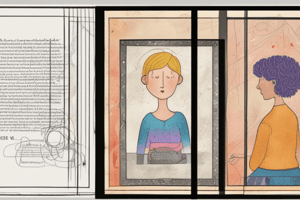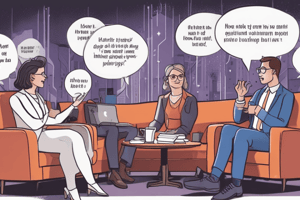Podcast
Questions and Answers
Which of the following BEST explains the Motivational Interviewing spirit component known as partnership?
Which of the following BEST explains the Motivational Interviewing spirit component known as partnership?
- Providing guidance on the best decisions for clients
- Offering support without any conditions
- Honoring the expert role that each client plays in making decisions (correct)
- Being directive in the change process
Which Motivational Interviewing trap is defined as, 'targeting the first behavior change you hear before exploring the client's concerns fully'?
Which Motivational Interviewing trap is defined as, 'targeting the first behavior change you hear before exploring the client's concerns fully'?
Premature-focus trap
Which Motivational Interviewing spirit component focuses on discovering the client's personal interests in motivation to change?
Which Motivational Interviewing spirit component focuses on discovering the client's personal interests in motivation to change?
- Evocation (correct)
- Partnership
- Compassion
- Acceptance
After a client responds with '4' on the confidence ruler regarding the importance of changing their alcohol use, what key question should the social worker follow up with?
After a client responds with '4' on the confidence ruler regarding the importance of changing their alcohol use, what key question should the social worker follow up with?
In which of the following treatment settings did Motivational Interviewing originate?
In which of the following treatment settings did Motivational Interviewing originate?
Which of the following applications of the Motivational Interviewing spirit works to understand the client's feelings and perspectives without judging, criticizing, or blaming?
Which of the following applications of the Motivational Interviewing spirit works to understand the client's feelings and perspectives without judging, criticizing, or blaming?
The Motivational Interviewing spirit component of acceptance is MOST strongly associated with the philosophy of which therapy?
The Motivational Interviewing spirit component of acceptance is MOST strongly associated with the philosophy of which therapy?
Genuine affirmations can help build rapport with clients.
Genuine affirmations can help build rapport with clients.
What type of reflection does the following interaction demonstrate: A client says, 'But I can't stop smoking. All of my friends smoke.' The counselor responds, 'You're troubled at the thought of not being able to smoke with your friends, and at the same time you're worried about how it's impacting your blood pressure.'?
What type of reflection does the following interaction demonstrate: A client says, 'But I can't stop smoking. All of my friends smoke.' The counselor responds, 'You're troubled at the thought of not being able to smoke with your friends, and at the same time you're worried about how it's impacting your blood pressure.'?
When summarizing what the client has said, which of the following should you do FIRST according to Motivational Interviewing?
When summarizing what the client has said, which of the following should you do FIRST according to Motivational Interviewing?
What is the BEST example of an empathic response to a client who shared about being late for a job interview due to their partner's actions?
What is the BEST example of an empathic response to a client who shared about being late for a job interview due to their partner's actions?
According to the Motivational Interviewing approach, what is a good FIRST step for a client seeking treatment for gambling at the request of his brother?
According to the Motivational Interviewing approach, what is a good FIRST step for a client seeking treatment for gambling at the request of his brother?
The Motivational Tool, 'MI-SafeCope', is a program developed to work with which population?
The Motivational Tool, 'MI-SafeCope', is a program developed to work with which population?
What skill to elicit change talk does the therapist demonstrate when asking a client to explore what it would look like for their situation to change?
What skill to elicit change talk does the therapist demonstrate when asking a client to explore what it would look like for their situation to change?
The spirit of Motivational Interviewing includes which of the following concepts?
The spirit of Motivational Interviewing includes which of the following concepts?
Which process of change involves developing a trusting and resilient therapeutic alliance between you and the client?
Which process of change involves developing a trusting and resilient therapeutic alliance between you and the client?
During which Motivational Interviewing process do the counselor and client develop a shared understanding of what the client sees as the presenting problem?
During which Motivational Interviewing process do the counselor and client develop a shared understanding of what the client sees as the presenting problem?
Study Notes
Motivational Interviewing Overview
- Motivational Interviewing (MI) emphasizes a collaborative partnership between the client and counselor, respecting the client's expertise in their own life decisions.
- Originated in substance use disorder treatment, MI aims to enhance motivation for change.
Key Components of the MI Spirit
- Partnership: Recognizes the client's role in decision-making; essential for building trust.
- Evocation: Focuses on uncovering the client's intrinsic motivations for change.
- Acceptance: Linked to client-centered therapy, fostering understanding of the client's feelings without judgment.
- Compassion: Involves a genuine concern for the client’s well-being.
Identifying Common Traps and Techniques
- Premature-Focus Trap: Addressing the first change mentioned by the client without exploring concerns fully can be counterproductive.
- Double-Sided Reflection: A technique where the counselor acknowledges both the client's resistance and their concerns effectively to deepen understanding.
- Looking Forward: Encourages clients to envision the future outcomes of their behaviors, facilitating internal motivation.
Effective Communication Strategies
- Utilize tools like the confidence ruler to gauge client motivation and importance of change.
- Summarize client statements by confirming understanding before providing feedback; essential for clarity and rapport-building.
- Genuine affirmations strengthen the therapeutic relationship and encourage positive dialogue.
Empathy in Practice
- Demonstrating empathy is crucial; tailored responses that reflect the client’s emotions make a significant impact.
- Understand the client’s specific concerns, like their financial anxieties impacting their children, to navigate discussions effectively.
Initial Steps for Treatment
- Focusing on the client’s goals and concerns is fundamental when treatment is prompted by external factors, such as family influence.
- Building a trusting and resilient therapeutic alliance is vital in the initial process of engaging with clients during MI.
Conclusion and Core Concepts
- MI encapsulates four primary concepts: Acceptance, Evocation, Compassion, and Partnership, forming the foundation for effective interventions in client treatment.
Special Populations and MI Tools
- Programs like "MI-SafeCope" have been developed for specific groups, such as adolescents dealing with suicide attempts, highlighting the adaptability of MI techniques.
Studying That Suits You
Use AI to generate personalized quizzes and flashcards to suit your learning preferences.
Description
This quiz consists of flashcards designed to test your knowledge of the key components and concepts of Motivational Interviewing. It covers essential topics, including the spirit of partnership and common traps to avoid in the interviewing process. Perfect for students and professionals looking to enhance their skills in motivational techniques.





